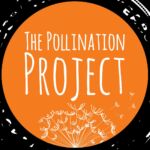In The Pollination Project’s ten years of operation, our community has funded almost 700 projects focused on environmental conservation and regeneration! Although every grassroots leadership project is unique, today we are using the blog to highlight a few that offered unique local solutions to global challenges:
1. Brick by Brick: Upcycling single-use plastics into building materials
Pollution from single-use plastics is a major problem in Uganda, clogging waterways and streets. David Miiro and a group of fellow student volunteers learned about an innovative way to upcycle plastic bottles, and decided to apply this knowledge to create materials for housing construction.
The team upcycled 15,000 used plastic bottles, and trained 40 other youth in the local community to use these bottles to make alternatives to traditional bricks. Traditional building materials, such as bricks, require an extensive burn time to finish them, which promotes deforestation.
The bottles were collected and compacted with soil, making the houses constructed with them cost-effective, strong, and able to buffer heat as well as withstand earthquakes. One house can use as many as 18,000 bottles; this work was an important demonstration project to show the community how single-use plastics can be meaningfully repurposed to benefit society.
2. SITES: An app that inspires people to clean up litter
SITES is a community based, student-led volunteer project that encourages digital community around litter pick-ups, while helping people quantify and share their progress. Participants download the Litter CleanUp app (free and available on iOS and Android devices) and volunteer by taking photos within the app of litter they pick up.
The app automatically tracks each volunteer’s progress, verifies their cleanup submissions to ensure they’re actually picking up litter, and allows them to share their cleanups with others and connect with fellow volunteers.
Since its formation, Clean Planet Project has inspired nearly 1,695 volunteers to clean the planet, resulting in a collective cleanup of over 108,312 pieces of litter!
3. Chili Fences: Reducing human-elephant conflict
Jimmy Kule is a conservationist living in Uganda. In his community, there were growing instances of human-elephant conflict. Local farmers complained that elephants were eating their crops and, in some cases, causing damage to their homes. Jimmy saw that this was a serious threat to the local elephant populations. Angry farmers are less likely to support elephant conservation, and more likely to turn a blind eye to poaching.
Jimmy researched potential solutions and learned that elephants are deterred by “chili fences,” border plantings of chili seedlings that protect a farmer’s crops and livelihood. He received funding to create “chili fences” around 30 local farms. This proved to be highly effective and non-lethal to elephants; in addition, the farmers were able to sell the chilis in the market after harvesting to fund future chili fences.
4. Radio Chicharria: Preserving indigenous knowledge
Mezcala is an indigenous community in Mexico with a history of over 500 years of resistance against invasion and privatization of their ancestral land. They maintain communal land rights even now, making the villagers with their own traditional form of government the only owners of their land. One of the central pillars for the continuation of local stewardship customs and collective memory and knowledge is and has always been oral tradition.
A group of leaders from Mezcala received funding for Radio Chicharria, a community radio project that translates this oral tradition into the new landscape of communication. Through a series of podcasts, the group produced regular programming on the customs, traditions, and history of protecting their sacred home.
They also produced stories highlighting threats to local environmental quality. In 2020, they published an article on the contamination generated by a slaughterhouse, who was dumping their waste in the forests and mountains behind the village. In response the municipality of Poncitlán, which is responsible for regulation, had to close the slaughterhouse.
5. Mukuru Clean Stove: Reducing household air pollution in Kenya
Charlot Magayi was orphaned at 10 in the Mukuru Kwa Njenga slums, one of the biggest in Nairobi. By sixteen she was a teenage mom and her journey got even harder from there. She had to drop out of school to figure out a way to fend for herself and her daughter. Her first job was selling charcoal, the only fuel she could afford. Charlot and her daughter kept suffering from respiratory tract infections; when her daughter turned two she suffered a severe burn injury from a traditional stove.
After a two year break from school, she was finally able to save enough for tuition and enrolled in an adult school – which opened her eyes to the health hazards caused by charcoal and other harmful solid fuels.
Burning solid fuels such as wood, charcoal and agricultural waste in open fires and traditional stoves exposes families to air pollution levels as much as 50 times greater than the World Health Organization guidelines for clean air. Clean cook stoves decrease fuel consumption by 30-60%, reduces toxic smoke emissions by 50-90% and lowers the risk of burns in children under 5 years by 40%.
Charlot decided she wanted to inspire fellow women to lead the fight against household air pollution in Africa. She founded Mukuru Clean Stoves; a social enterprise that produces clean, affordable and reliable cook stoves targeting under-served markets to help mothers keep their children safe, save on fuel consumption and reduce household air pollution. The Pollination Project was honored to provide seed funding for this work, which has since been recognized by the UN and many other international outlets. Charlot has now distributed 70,000 stoves, impacting over 350,000 lives.


